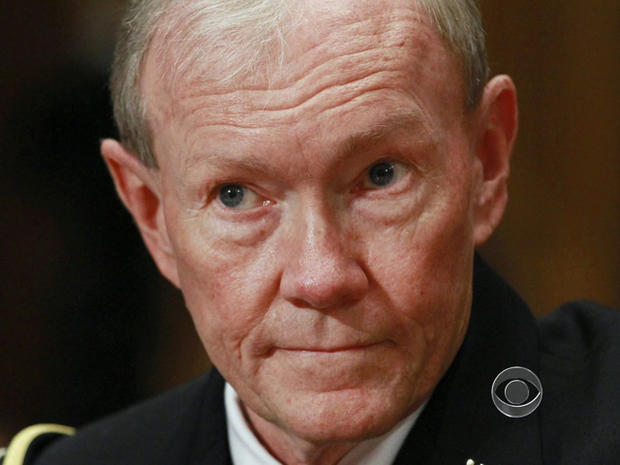General outlines options for U.S. intervention in Syria
(CBS News) WASHINGTON -- As the U.S. begins to wind down the war in Afghanistan, some members of Congress are trying to pressure President Obama to take more direct action to stop the bloodbath in Syria. More than 100,000 people -- mostly civilians -- are believed to have died in the civil war. In a letter to the Senate Armed Services committee, America's top military officer outlined several possible plans for U.S. intervention. But each plan comes with a heavy price.
U.S. military prepares for potential chemical weapons in Syria
U.S. considering use of military force in Syria
Power: U.N.'s "failure" to respond to Syria a "disgrace"
Video: U.S. involvement in Syrian conflict
Joint Chiefs Chairman Gen. Martin Dempsey listed five options the U.S. military is prepared to carry out if the president gave the order:
- Train, advise and assist opposition forces in safe areas outside of Syria. That would require several hundred to several thousand American troops and cost $500 million a year. It would strengthen the opposition but also might help extremist factions linked to al Qaeda.
- Conduct limited air and missile strikes against Syrian forces and command centers. Hundreds of aircraft and ships operating in the Mediterranean would attack hundreds of targets inside Syria. That would cost billions of dollars and inflict significant damage on Syrian forces but could not guarantee the regime's collapse and would probably cause civilian casualties.
- Establish a no-fly zone over all of Syria. That, too, would require hundreds of aircraft and cost up to $1 billion a month. And it might not accomplish much since the Syrian army relies mostly on ground-based artillery and missiles, not air power.
- Establish buffer zones inside Syria as safe havens for opposition fighters and civilians. That would require smaller no-fly zones but also thousands of U.S. troops to defend the safe havens. Estimated cost more than $1 billion a month.
- Destroy or seize Syria's chemical weapons -- a massive operation that would require a no-fly zone plus air strikes plus thousands of American troops. Again, the estimated cost would be well over $1 billion a month.
Dempsey warned that intervention would end up costing so much, the U.S. military would be unable to respond to crises in other parts of the world. Or it might trigger a sudden collapse of the Syrian government and "unleash the very chemical weapons we seek to control."

